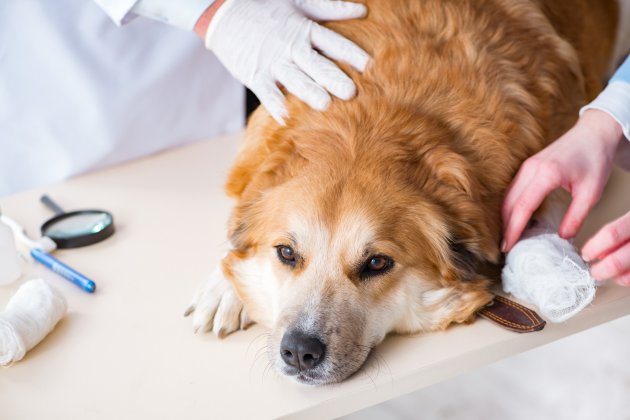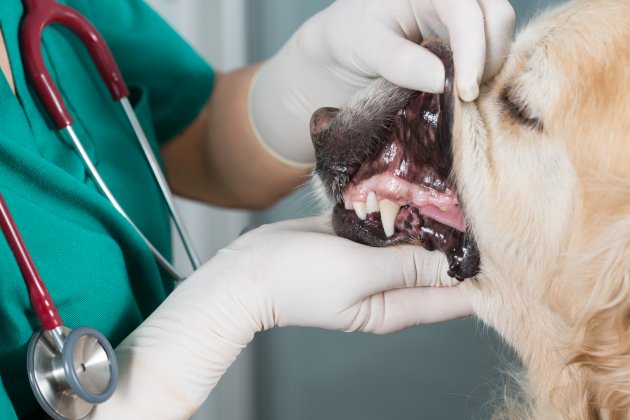Dogs are very commonly seen in every household. While there are many things that you can do to keep your dog healthy and happy; eventually, just like people, they will get sick. These are seven of the most common health problems seen in dogs and what you can do to get your dog back to a healthy life.

1. Gastrointestinal Issues
During your dog's life, they will have digestive issues. While most of the time, this is just short-lived, there are times that this is an early indication of another disease. There are many signs that your dog can display that would mean they are having gastrointestinal issues. Some of the common symptoms seen in dogs are:
- Vomiting
- Diarrhea
- Drooling
- Not eating
- Bloody or mucus in their stool
While these signs can point to many different diseases, these are some of the most common reasons that a dog will have gastrointestinal issues:
- Pancreatitis – This is an inflammation of the pancreas, usually from eating a fatty meal
- Obstruction
- Parasites
- Dietary indiscretion
- Organ failure
Your veterinarian can test for underlying disease and get your dog on the best treatment for their gastrointestinal issues.
2. Heart Disease
Older dogs can suffer from heart disease. As they age, their heart no longer beats effectively. This can lead to many other problems. There are many different types of heart disease, depending on what part of the heart is not working. Typical signs associated with heart disease are:
- Coughing
- Trouble breathing
- Collapsing episodes
- Fluid in the chest or abdomen
Your veterinarian can listen to your dog’s heart and lungs to see if they have a heart murmur. This would indicate that there was something wrong with your dog’s heart.
If your dog does show signs of heart disease, many tests may have to be done, including chest x rays, Echocardiogram (ultrasound of the heart), and EKG. These tests will help your veterinarian determine how progressed the disease is. There are different medications that your dog can be started on to help the heart beat more effectively and decrease the amount of fluid in the chest and abdomen.
3. Joint Problems
As your dog ages, they may have joint pain. During this time, they will also have weakening of the cartilage of the joints. When the cartilage wears down eventually, your dog's bones will be rubbing together, creating excessive bony formation. The build-up of bone around the joint is the cause of their pain. Signs of arthritis and joint pain in dogs are:
- Limping
- Trouble walking
- Difficulty standing, especially after laying down for a long time
There are many different medications and supplements your veterinarian can prescribe for your dog to help ease their pain. Sometimes there are even surgical options to fix the problem. If you notice any of these symptoms in your dog, schedule an appointment with your veterinarian. They can give you advice on how to give your dog a pain-free life.

4. Dental disease
Unless your dog has their teeth brushed twice a day, they will eventually have dental disease. This is the build-up of tartar on your dog's teeth, which causes their bad breath. Small dogs are very prone to dental disease and will need routine dental cleanings. Signs that your dog has dental problems are:
- Bad smelling breath
- Drooling
- Difficulty eating
- Swollen face right under the eye
You can also see if your dog has dental disease by looking at your dog's teeth. You will be able to see the tartar build-up on their teeth. If your dog does have tartar on their teeth, the only way to remove it is to have your veterinarian clean their teeth. This is very similar to the type of cleaning done at a human dental office.

Prevention of dental disease
After your veterinarian cleans your dog's teeth, there are many things that you can do to help prevent dental disease. These are:
- Dental chews
- Additives for their water
- Brushing their teeth daily
5. Cancer
As your dog ages, you may notice many lumps and bumps on them. These may just be fatty masses, but they may be cancerous. Your veterinarian can take a small sample of the tumor and look at the cells under the microscope to help you determine if they are malignant masses or not. Many signs can lead you to think that your dog has cancer, including:
- Vomiting
- Diarrhea
- Weight loss
- Visually seeing a growth
If you notice any of these signs, your veterinarian can run a test to see if they have cancer and help you decide on the best possible treatment route for your dog.
6. Vision Loss
As dogs get older, they start to develop cataracts in their eyes. Cataracts are the thickening of the lens of the eye. This is the structure responsible for your dog’s vision. Cataracts are seen as a whitish blue haze in the eye that dogs develop as they get older. Eventually, your dog's cataracts will become so cloudy that they cannot see any more.
Dogs can have cataract surgery, just like people can. This would be a specialized procedure done by a veterinary ophthalmologist. The cost of this procedure can be around $4,000+, depending on where the surgery is done.
7. Obesity
Just like with people, your dog can also become obese. Many dogs will not stop eating when they are full; they will stop when their bowl is empty. If your pet has put on a few extra pounds, this can lead to many other medical issues such as:
- Joint pain and arthritis
- Heart issues
- Liver and kidney issues
- Difficulty breathing
If your dog is overweight, you can help them lose weight by increasing their exercise and decreasing the amount of food that you are feeding them. There are low-fat diets that are specifically designed to help your dog lose weight. Talk with your veterinarian about other ways that you can help your dog lose weight.
While your dog may currently be sick, there are many things that you can do to help them get better quicker. As soon as you notice that something is not right with your dog, make an appointment to see your veterinarian. They can help you get your dog back to feeling good. The quicker you start your dog on medication, the quicker they can return to their healthy and happy life.
Further reading:
- WebMD. Dog Health Conditions A to Z
- www.cdc.gov. Dogs